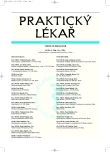-
Medical journals
- Career
Biochemical molecular mechanisms of heart failure (Part 2)
Authors: J. Masopust
Authors‘ workplace: Přednosta: doc. MUDr. Richard Průša, CSc. ; 2. lékařská fakulta ; Ústav klinické biochemie a patobiochemie ; Univerzita Karlova v Praze
Published in: Prakt. Lék. 2007; 87(1): 26-31
Category: Various Specialization
Overview
The article presents an overview of recent findings in the molecular pathobiochemistry of heart failure. In particular, the author describes a role for disturbances in beta-adrenergic signalisation, and the importance both of the renine-angiotensine-aldosterone system and of natriuretic peptides (ANP, BNP). In addition, new methods of laboratory diagnostics and advances in the treatment of heart failure are presented. With its increasing incidence in the population, this clinical syndrome is becoming a greater health and socio-economic problem, and one which requires effective prevention.
Key words:
heart failure, molecular biochemistry, diagnostics and therapy
Labels
General practitioner for children and adolescents General practitioner for adults
Article was published inGeneral Practitioner

2007 Issue 1-
All articles in this issue
- Patent foramen ovale as a cause of paradoxical embolization in scuba divers. Screening possibilities, therapeutic and preventive recommendation.
- Hypoglycaemia-associated autonomic failure, its clinical assessment and treatment.
- Chronic renal failure in primary care
- Prescription of psychotropic drugs during pregnancy and breast-feeding in the general practitioner’s surgery.
- Wilson’s disease
- Diagnostics and treatment of rheumatoid arthritis – some new aspects
- Biochemical molecular mechanisms of heart failure (Part 2)
- Antimicrobial resistance in seven invasive bacterial species* monitored within EARSS in the Czech Republic (CR) from 2000 – 2006. (*Streptococcus pneumoniae, Staphylococcus aureus, Enterococcus faecalis, Enterococcus faecium, Escherichia coli, Klebsiella pneumoniae, Pseudomonas aeruginosa).
- Childhood injuries and their prevention
- Our experience with the treatment of acute mesenterial ischemia
- Craniopharyngioma in 79 years old man – a case study
- General Practitioner
- Journal archive
- Current issue
- Online only
- About the journal
Most read in this issue- Chronic renal failure in primary care
- Craniopharyngioma in 79 years old man – a case study
- Wilson’s disease
- Hypoglycaemia-associated autonomic failure, its clinical assessment and treatment.
Login#ADS_BOTTOM_SCRIPTS#Forgotten passwordEnter the email address that you registered with. We will send you instructions on how to set a new password.
- Career

